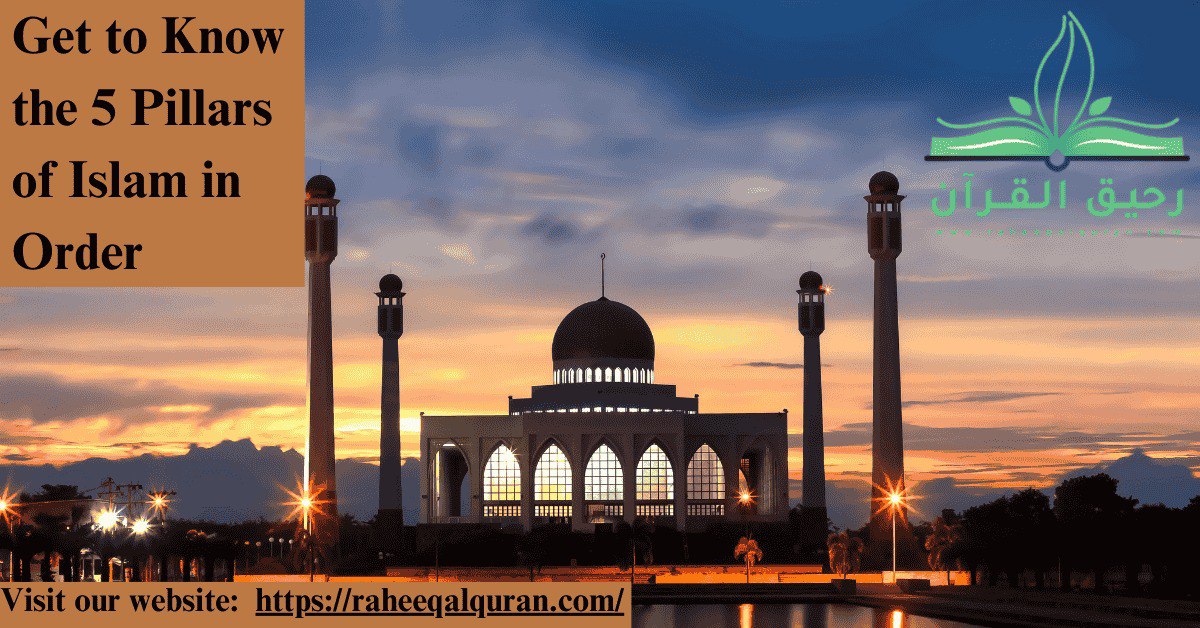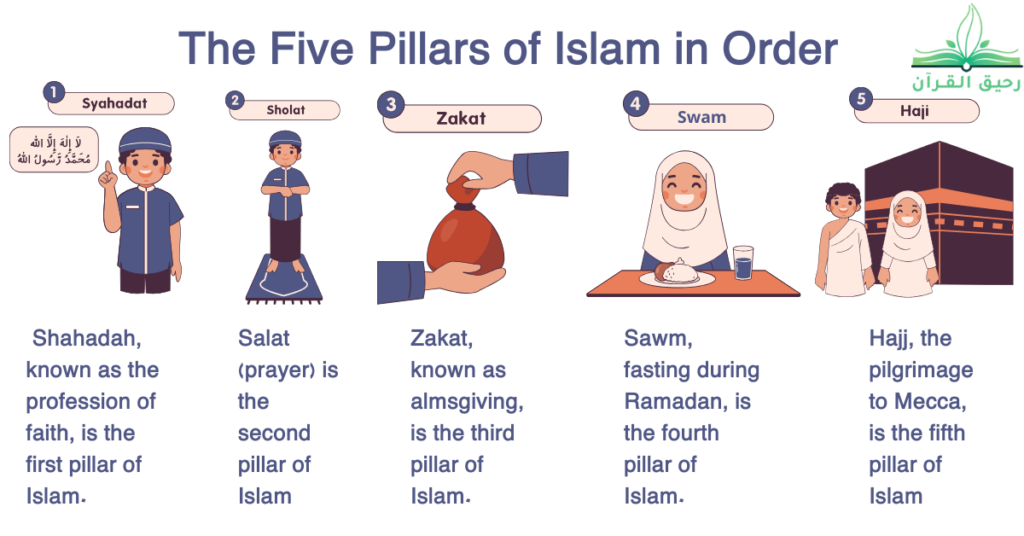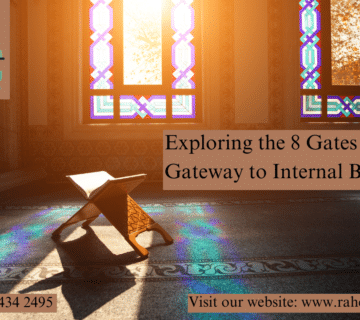Islam is like a structure, perfectly integrated within itself. This structure consists of five main pillars, known as the 5 Pillars of Islam.
It is narrated on the authority of ‘Abdullah ibn ‘Umar that the Messenger of Allah (ﷺ) said:
“The foundation of Islam is built upon five (pillars): testifying that there is no god but Allah and that Muhammad is His servant and Messenger, establishing the prayer, paying Zakat, performing Hajj to the House (Ka’bah), and fasting during Ramadan.”
The 5 Pillars of Islam, also known as the 5 Arkan of Islam, are the main foundation for any Muslim’s life. They serve as a framework for faith, community, and life. Muslims follow these core duties to attain Jannah. These well-known pillars consist of Shahada, Salah, Zakat, Sawm, and Hajj. In this article, you will learn more about each pillar’s definition and importance.
Shahadah
Shahadah, known as the profession of faith, is the first pillar of the 5 pillars of Islam. It is the declaration and affirmation that there is no god but Allah (SWT), and Muhammad (ﷺ) is His Messenger. This simple yet profound statement testifies to a Muslim’s acceptance of and commitment to Islam.
Reverts to Islam required to take the Shahadah as their first step to joining Islam. When reciting the Shahadah, intention (Niyyah) is very important. One must recite it sincerely, with both heart and mind. Allah says in the Quran:
“And those who believe and do righteous deeds and believe in what has been sent down upon Muhammad—and it is the truth from their Lord—He will remove from them their misdeeds and amend their condition.” (Quran 47:2)
Salat
Salat (prayer) is the second pillar of the 5 pillars of Islam. It is obligatory for every adult Muslim. It is an act of worship to Allah (SWT) performed through five daily prayers at set times. Salat involves a series of physical movements, recitations, and supplications.
Each Salat consists of a set number of units called rak‘ahs. Rak‘ahs include standing, bowing, and prostrating, accompanied by recitations of verses from the Qur’an, including the opening chapter, Surah Al-Fatiha. The prayers, in order, are as follows:
- Fajr: Starts at dawn and ends at sunrise.
- Zuhr: Midday; starts once the sun has passed its highest point and lasts until Asr.
- Asr: Begins in the late afternoon and ends shortly before sunset.
- Maghrib: Starts after sunset, once the sun dips below the horizon.
- Isha: Begins after Maghrib (when the red afterglow disappears) and lasts until midnight.
Before you pray, you must undergo a purification process called Wudu. It involves washing specific parts of your body. This process is believed to remove minor sins from a believer.
Adhan, the call to prayer, echoes from mosques to signal the time for Salah. Even when praying at home, Muslims have the option to recite the Adhan before beginning their prayers. Salah serves as a vital reminder of the supreme greatness of Allah (SWT).
While performing Salah, it is necessary to clear the mind of all earthly distractions. Believers participate in congregational Salah at their local mosque, showcasing the unity and equality in Islam—a reminder that Allah (SWT) created all humans, and they will ultimately return to Him.
Zakat
Zakat, known as almsgiving, is the third pillar of the 5 pillars of Islam. It is an obligatory charity of 2.5% of one’s wealth (cash, property, gold, or silver) for those who are eligible, as outlined in the Quran.
According to Islamic teachings, Zakat purifies wealth and helps it grow, both literally and metaphorically. Donating a portion of one’s wealth protects individuals from negative traits such as stinginess and selfishness.
Abu Hurairah (may Allah be pleased with him) reported that the Messenger of Allah (ﷺ) said, “Wealth does not diminish by giving Sadaqah (charity).” (Muslim)
In addition, Allah said in the Quran:
“Indeed, those who believe and do righteous deeds and establish prayer and give Zakat will have their reward with their Lord, and there will be no fear concerning them, nor will they grieve.” (Al-Baqarah 2:277)
Sawm
Sawm, which is fasting during the holy month of Ramadan, is the fourth pillar of the 5 pillars of Islam. Fasting (Siyam) is not just abstaining from food and drinks. It also involves refraining from sins, wrongdoings, and bad habits. It symbolizes the strong and sincere relationship between a Muslim and Allah. Muslims fast from dawn until sunset and have two meals: Suhoor and Iftar. Suhoor is the pre-dawn meal, and Iftar is the meal after sunset to break the fast.
Ramadan is a spiritual month where the initial verses of the Holy Quran were revealed to Prophet Muhammad ﷺ as a guide for all humanity. This revelation occurred during the final ten nights of Ramadan, on Laylat al-Qadr (the Night of Decree). Allah SWT said in the Quran:
“Indeed, We sent the Quran down during the Night of Decree.” (Al-Qadr 97:1)
The most important purpose of fasting is to gain taqwa (closeness to Allah SWT) and to build a strong connection with Him. When the month of Ramadan ends, Muslims celebrate Eid ul-Fitr. The day begins with congregational prayers, prior to which Zakat ul-Fitr is given to those in need. Afterward, Muslims gather with their families and loved ones, share gifts, and celebrate together.
Hajj
Hajj, the pilgrimage to Mecca, is the fifth pillar of the 5 pillars of Islam. It is a sacred duty for every able-bodied Muslim who is physically and financially capable of undertaking the journey to Makkah. Hajj is a once-in-a-lifetime obligation and represents the pinnacle of a Muslim’s religious life. It takes place during the 12th and final month of the Islamic calendar, following the festival of Eid ul-Adha.
Pilgrims are required to dress in simple white garments and enter a state of holiness known as Ihram. Ihram fosters a profound sense of unity and solidarity among the Ummah, as no individual—whether wealthy or modest, local or foreign—holds a position of superiority. Regardless of differences in age, background, social status, or ethnicity, all are equal in the sight of Allah (SWT).
Hajj is a time when Muslims deepen their faith and devotion to Allah SWT. It is a remarkable spiritual gathering with over two million Muslims from across the globe.
Prophet Muhammad ﷺ said “Whoever performs Hajj with any obscenity shall return (from Hajj) like a newborn baby.”
Upon knowing the 5 pillars of Islam, we must renew our determination to draw closer to Allah by doing good deeds and avoiding what displeases Him.
To learn more about Quran recitation and memorization courses, visit our website.






No comment